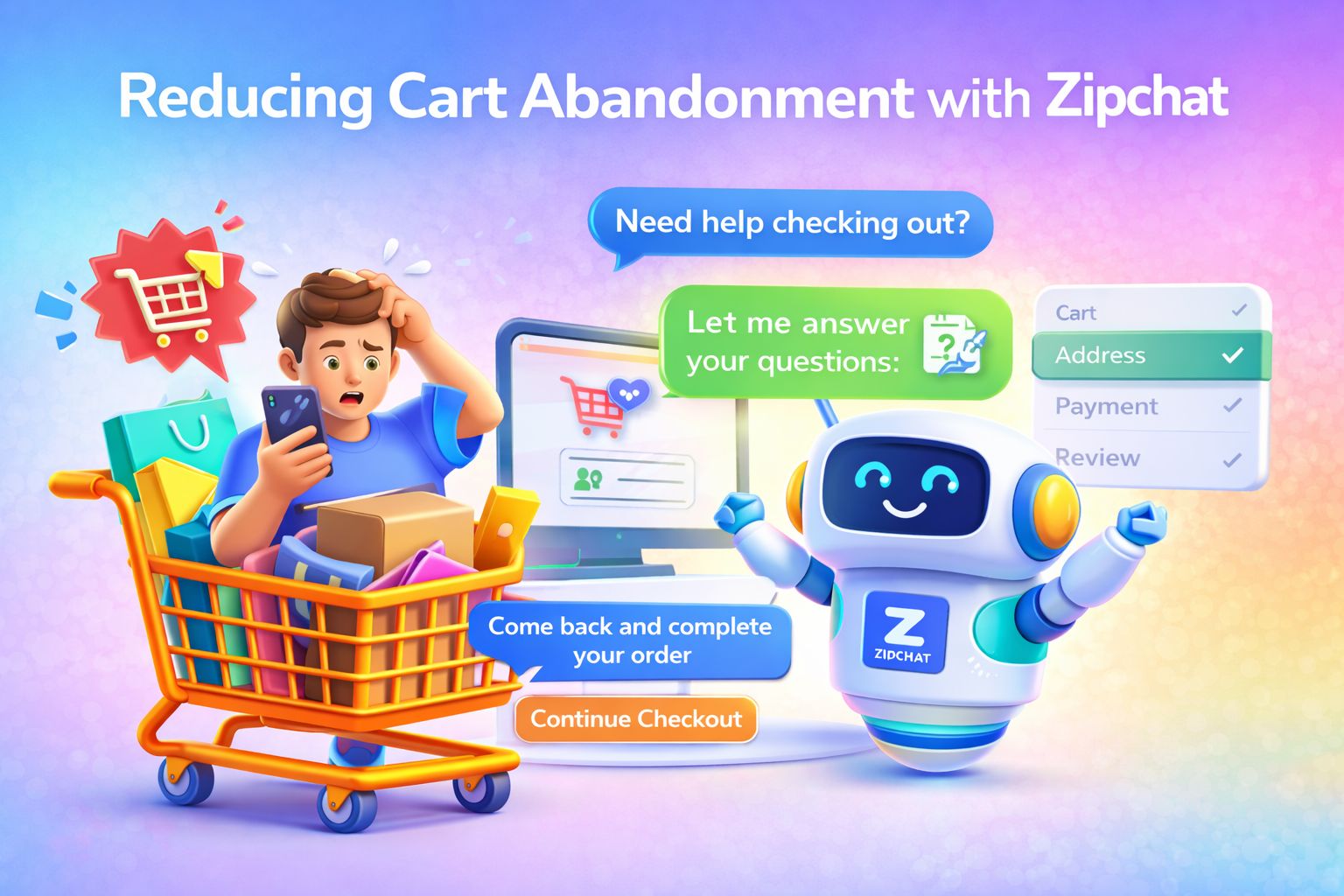Try Zipchat in Action!
Enter your store URL to see how Zipchat would behave.

In today's rapidly changing business landscape, customer service has become a critical differentiator for companies across industries. As we look ahead to the year 2024, it is essential for businesses to understand the evolving landscape of customer expectations and the role of technology in meeting those expectations. This article will delve into the essential customer service statistics for 2024, highlighting the key trends and challenges that companies must navigate to deliver exceptional customer experiences.
Customer Expectations in 2024
Customer expectations are continually evolving, driven by advancements in technology and changing societal norms. In 2024, we can expect customers to become even more discerning, seeking personalized and seamless experiences across every interaction. Let's explore two key aspects of customer expectations in 2024.
Expectations of Smarter Customers
In the year 2024, customers will be more informed and empowered than ever before. Thanks to the ubiquitous availability of information, customers will demand tailored experiences that reflect their preferences and needs. Customization will no longer be a luxury but a baseline expectation. Companies that fail to meet these expectations risk losing customers to competitors who can deliver on personalized experiences.
Moreover, the rise of artificial intelligence and machine learning technologies will further enhance customer experiences. These technologies will enable businesses to anticipate customer needs, provide proactive solutions, and offer real-time support. As a result, customers will expect companies to leverage these advanced tools to deliver hyper-personalized interactions that cater to their individual preferences and behaviors.
Impact of High Customer Service Expectations
The rising customer expectations in 2024 will have a significant impact on businesses. According to recent studies, 72% of customers will switch to a competitor if they encounter a single negative customer service experience. This shift underscores the importance of providing exceptional customer service at every touchpoint. Companies that excel in meeting and exceeding customer expectations will enjoy increased loyalty, customer retention, and positive brand reputation.
Furthermore, the concept of omnichannel customer service will become paramount in 2024. Customers will expect seamless transitions between various communication channels, such as social media, chatbots, phone support, and in-person interactions. Businesses that can provide a consistent and integrated experience across these channels will stand out in a competitive market, earning the trust and loyalty of their customers.
Challenges in Customer Service
Meeting the increasing customer expectations in 2024 is not without its challenges. Two key hurdles that businesses must navigate in delivering exceptional customer service are fragmented customer support interactions and the importance of seamless cross-channel journeys.
Fragmented Customer Support Interactions
In today's digital age, customers engage with businesses across multiple channels, such as email, social media, chatbots, and phone calls. However, this multi-channel approach often leads to fragmented customer support interactions, where communications and information are not seamlessly integrated. In fact, research shows that 58% of customers find it frustrating when they have to repeat information to multiple customer service representatives.
Imagine this scenario: a customer reaches out to a company via email to inquire about a product. After a few days, they follow up on social media, only to be asked to provide the same information again. This repetition not only wastes the customer's time but also creates a sense of frustration and dissatisfaction.
To overcome this challenge, businesses must invest in integrated customer service platforms that consolidate information and enable a seamless support experience across channels. By implementing a system that allows customer service representatives to access a centralized database of customer interactions, businesses can provide a more efficient and personalized service. This way, when a customer reaches out through a different channel, the representative can quickly access their previous interactions and provide a seamless experience, without requiring the customer to repeat themselves.
Importance of Seamless Cross-Channel Journeys
In 2024, customers will expect a unified experience across all touchpoints. They will demand the ability to start a conversation on one channel, such as a website chatbox, and seamlessly transition to another channel, like a phone call, without any loss of information or context. Research indicates that 72% of customers expect companies to know their purchase history regardless of the channel they use.
Imagine a customer browsing a company's website and initiating a chat with a customer service representative. After discussing their needs, the customer decides to make a purchase and requests a phone call to complete the transaction. In an ideal scenario, the customer service representative seamlessly transfers the conversation to a phone call, armed with all the information gathered during the chat. This level of continuity not only saves the customer from repeating themselves but also enhances their overall experience.
To meet these expectations, businesses must invest in technologies that enable them to provide a frictionless cross-channel journey, ensuring a consistent and personalized experience at every step. By integrating their various communication channels and leveraging customer data, companies can create a seamless transition between channels, allowing customers to switch between them effortlessly. This not only improves customer satisfaction but also increases the likelihood of repeat business and positive word-of-mouth recommendations.
Role of Artificial Intelligence (AI) in Customer Service
Artificial Intelligence (AI) will play a transformative role in customer service in 2024. The adoption of AI technology will bring numerous benefits to businesses, including enhanced personalization and improved customer service efficiency. Let's explore two key aspects of AI's role in customer service.
Artificial Intelligence (AI) is revolutionizing the way businesses interact with their customers. In addition to enhancing personalization and efficiency, AI is also reshaping the customer service landscape by introducing chatbots and virtual assistants. These AI-powered tools can provide instant responses to customer inquiries, streamline the resolution of common issues, and offer round-the-clock support, ultimately improving the overall customer experience.
Benefits of AI in Personalizing Customer Service
AI-powered tools and algorithms can analyze vast amounts of customer data to understand individual preferences and behaviors. By leveraging this data, businesses can deliver highly personalized customer service experiences. For example, AI can enable personalized product recommendations, tailored marketing messages, and proactive customer support, leading to increased customer satisfaction and loyalty.
Moreover, AI's ability to predict customer needs and anticipate potential issues allows businesses to address concerns before they escalate, further enhancing the customer service experience. By proactively engaging with customers based on their historical interactions and behavior patterns, companies can foster stronger relationships and build trust with their clientele.
Consumer Acceptance and Trust in AI
While AI technology presents exciting opportunities, consumer acceptance and trust are pivotal for its success. Research reveals that 63% of consumers are willing to trust AI-powered tools and services if they enhance their customer experience. However, building and maintaining trust requires transparency and education. Businesses should communicate clearly about how AI is being used and assure customers that their data is being handled securely and ethically.
Furthermore, as AI continues to evolve and become more integrated into everyday customer service interactions, it is essential for businesses to prioritize data privacy and security. Implementing robust data protection measures and complying with regulations such as GDPR not only safeguard customer information but also demonstrate a commitment to ethical AI practices, fostering trust and loyalty among consumers.
Importance of Customer Service Experience
In 2024, customer service experience will be just as important as the products and services themselves. Let's dive into two key aspects highlighting the significance of customer service experience.
Customer Experience as Important as Products
A recent study found that 80% of customers are willing to pay more for a better customer experience. Gone are the days when price and product alone determined customer loyalty. Companies that prioritize customer service experience and go above and beyond to exceed expectations will win the loyalty of customers, ensuring repeat business and positive word-of-mouth recommendations.
Furthermore, in today's competitive market landscape, where products and services are often similar across brands, customer service experience has emerged as a key differentiator. Consumers are not only looking for high-quality products but also expect a seamless and personalized customer service journey. This shift in consumer behavior has forced businesses to rethink their strategies and invest heavily in enhancing their customer service offerings.
Impact of Customer Service on Brand Loyalty
Customer service plays a crucial role in building and nurturing brand loyalty. Research shows that 66% of customers are likely to switch to a competitor based on poor customer service alone. Conversely, businesses that consistently deliver exceptional customer service see increased brand loyalty and advocacy. By investing in customer service training, empowering frontline employees, and utilizing technology effectively, companies can create positive experiences that contribute to long-term brand loyalty.
Moreover, the digital age has transformed the way customers interact with brands, making customer service experience more critical than ever. With the rise of social media and online reviews, a single negative customer service interaction can quickly escalate and damage a brand's reputation. On the flip side, brands that excel in customer service not only retain existing customers but also attract new ones through positive online feedback and recommendations, further solidifying their position in the market.
Customer Service Metrics and Benchmarks
Measuring and benchmarking customer service metrics is essential for businesses to gauge their performance and identify areas for improvement. Let's explore two key metrics that companies should track in 2024.
Average Response Times Across Channels
Customers expect prompt and efficient responses to their queries and concerns. Research indicates that 66% of customers expect a response to their customer service inquiries within 24 hours. However, response times can vary across channels, with some customers experiencing delays. Businesses should strive to reduce response times and ensure consistent service levels across all channels, creating a positive impression and satisfying customer expectations.
Benchmarks for Customer Satisfaction and Net Promoter Score (NPS)
Customer satisfaction and net promoter score (NPS) are valuable indicators of customer loyalty and advocacy. By measuring customer satisfaction and NPS, businesses can understand how their customers perceive their service and identify areas for improvement. Leveraging industry benchmarks can provide valuable insights into how a company's performance compares to its competitors, highlighting areas of strength and areas that require attention.
The Future of Customer Service
Looking ahead, the future of customer service is filled with exciting possibilities. It is important for businesses to anticipate and adapt to emerging trends to stay competitive and meet evolving customer expectations. Let's explore two key insights into the future of customer service in 2024.
Anticipating Trends in Customer Expectations
The ability to anticipate customer expectations will be crucial in delivering outstanding customer service in 2024. By analyzing industry trends, leveraging customer insights, and staying attuned to changing customer behavior, businesses can proactively identify and meet emerging customer expectations. This proactive approach will pave the way for enhanced customer satisfaction and loyalty.
Growth of AI-Powered Customer Support
In the future, AI-powered customer support will become more prevalent. AI technology will continue to advance, enabling businesses to automate repetitive tasks, provide instant responses to customer inquiries, and personalize interactions at scale. By embracing AI-powered customer support, companies can streamline their operations, enhance efficiency, and free up human agents to focus on nuanced customer interactions that require empathy and problem-solving skills.
FAQ about Customer Service Statistics
Now, let's address some frequently asked questions about customer service statistics in 2024.
Q: Are personalized customer experiences really that important?
A: Yes, personalized customer experiences are crucial in today's competitive business landscape. Customers have come to expect tailored interactions that meet their specific needs and preferences. Failing to provide personalization can result in customer dissatisfaction and loss of business.
Q: What steps can businesses take to improve their customer service experience?
A: Improving customer service experience starts with a customer-centric mindset. Companies can invest in employee training, implement technologies that enable effective communication and seamless interactions, and actively seek feedback from customers to identify areas for improvement.
Q: How can businesses build trust in AI-powered customer service?
A: Building trust in AI-powered customer service requires transparency and education. Businesses should be clear about the role of AI and how it enhances customer experiences. Additionally, companies should prioritize data security and privacy, assuring customers that their information is handled ethically and responsibly.
Q: What are some key metrics that businesses should track to measure their customer service performance?
A: Two key metrics that businesses should track are average response times across channels and customer satisfaction/Net Promoter Score (NPS). By monitoring these metrics, companies can identify areas for improvement and gauge the effectiveness of their customer service initiatives.
Q: What does the future hold for customer service?
A: The future of customer service is characterized by ever-evolving customer expectations and technological advancements. Businesses should anticipate and adapt to emerging trends, such as increased personalization and the growth of AI-powered customer support, to remain competitive and deliver exceptional customer experiences.
In conclusion, the essential customer service statistics for 2024 highlight the increasing importance of delivering exceptional customer experiences. By understanding and meeting evolving customer expectations, embracing AI-powered solutions, and prioritizing customer service experience, businesses can thrive in a competitive landscape and foster long-term brand loyalty. As we look to the future, it is crucial for companies to adapt and embrace emerging trends to stay ahead of the curve and meet the demands of the smarter, more discerning customers of 2024.
Transform Your Ecommerce Experience with Zipchat AI
Ready to elevate your customer service and boost your sales? Zipchat AI is here to revolutionize your ecommerce platform with our advanced AI Chatbot. Engage your customers proactively, provide stellar support, and watch your conversion rates soar with an impressive average of 13.4% Chat-to-Sale. Don't miss out on the opportunity to transform your customer interactions. Start your 7-Day Free Trial today and join the forefront of customer service innovation!








